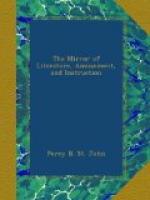The following sonnet was written by Ugo Foscolo, in English, and accompanied the Essays on Petrarch, in the edition of that work which was printed for private circulation. It was omitted when the volume was subsequently published, and is consequently known to very few:
TO CALLIRHOE, AT LAUSANNE.
Her face was veiled; yet to my fancied
sight
Love, sweetness, goodness, in her person
shin’d.
But, oh! I wak’d.——MILTON.
I twine far distant from my Tuscan grove,
The lily chaste, the rose that breathes
of love,
The myrtle leaf, and Laura’s hallow’d
bay,
The deathless flowers that bloom o’er
Sappho’s clay;
For thee, Callirhoe! yet by love and years,
I learn how fancy wakes from joy to tears;
How memory, pensive, ’reft of hope,
attends
The exile’s path, and bids him fear
new friends.
Long may the garland blend its varying
hue
With thy bright tresses, and bud ever
new
With all spring’s odours; with spring’s
light be drest,
Inhale pure fragrance from thy virgin
breast!
And when thou find’st that youth
and beauty fly,
As heavenly meteors from our dazzled eye,
Still may the garland shed perfume, and
shine,
While Laura’s mind and Sappho’s
heart are thine.
Literary Chronicle.
* * * * *
ENGLISH FRUITS.
The Strawberry.—Many varieties have been imported from other countries, and a far greater number have been obtained in this, chiefly from seeds properly prepared by cross impregnation; by which means, the strawberry has been wonderfully improved; instance the hautboys, scarlet, chilli, but particularly the splendid varieties, called “Wilmot’s superb,” and “Keen’s seedlings.”
The Raspberry, is also found wild in the British isles, on its native site, (with its companions, the bramble, and dewberry)—its shoots and fruits are diminutive, though the flavour of the berry is rich. No plant requires the skilful hand of the pruner more than this; of all others, it is, perhaps, the most viviparous, throwing up, annually, a vast redundancy of shoots, which, if not displaced at the proper season, would impoverish not only the fruit of the present, but also the bearing wood of the next year. The Dutch fruiterers have been successful in obtaining two or three fine varieties from seeds; and as this field of improvement is open, no doubt further exertions will bring forth new and valuable sorts.
The Gooseberry.—No domesticated fruit sports into greater variety than this: the endless lists of new sorts is a proof of this, and many large and excellent sorts there are, particularly the old Warrington red.
The Cherry.—Cultivation has accomplished wonders in the improvement of this beautiful native fruit. Instead of a lofty forest-tree bearing small bitter fruit, it has been long introduced to our orchards, is changed in appearance and habit, and even in its manner of bearing; has sported into many varieties, as numerous as they are excellent—nor is such improvement at an end: several new varieties have lately started into existence.




